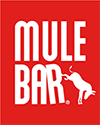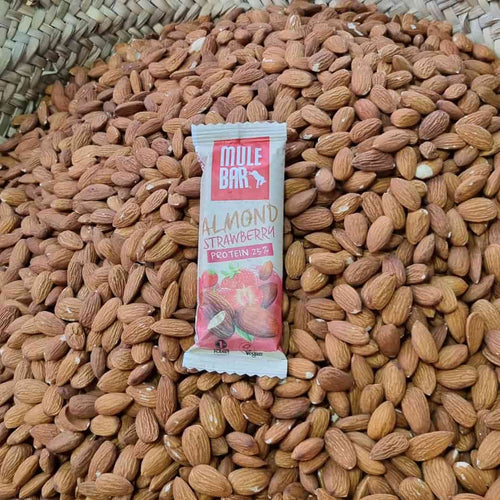Protein bars have become a go-to snack for athletes, fitness enthusiasts, and health-conscious individuals alike. But many wonder: do protein bars make you fat? The simple answer is no – as long as you understand calorie balance and choose the right bar. Let's explore how protein bars can support your health goals and when they might accidentally work against weight management.
What protein bars really are and how they fit into your diet
A protein bar is a convenient, nutrient-dense snack packed with extra protein to complement your diet. Plant-based protein bars are particularly popular, serving as excellent post-workout recovery aids or quick meal replacements when you're busy. Each bar provides a balanced mix of protein, carbohydrates, and fats to sustain your energy levels throughout the day. The protein content plays a crucial role – it helps build muscle, repairs tissues, and enhances satiety to keep hunger at bay.
At Mulebar, we craft 100% natural plant-based protein bars. Our vegan protein bars contain 25% protein per serving (10g in a 40g bar). Made with pea or soy protein, these bars are easily digestible with a satisfying crunch, perfect for post-workout recovery, pre-exercise energy boosts, between-meal snacks, or outdoor adventures. Whether you choose our Almond Strawberry bar with 25% pea protein or our Chocolate bar featuring 25% soy protein, both containing respectively of 14g and 7g sugar and 4g and 3g of fat, you're getting clean nutrition free from artificial additives.

Do protein bars cause weight gain? Energy balance decides
Contrary to popular belief, protein bars won't necessarily make you gain weight. In fact, when consumed wisely, they can actually support weight management. The high protein content boosts satiety , which often leads to consuming fewer calories overall. Choosing a protein bar over sugary snacks like pastries helps prevent excess calorie intake and unnecessary snacking.
However, it's important to remember that like any food, protein bars contribute to your daily energy intake. Weight changes ultimately depend on your energy balance - if you consume more calories than you burn through activity and metabolism, the surplus gets stored as fat. Even nutritious options like protein bars can lead to weight gain if they push your total intake beyond what your body needs.
Here's a practical example: Adding one 250-calorie protein bar daily while maintaining the same activity level could result in about 0.5 kg (1 lb) of weight gain in 2-3 weeks. On the flip side, replacing a higher-calorie afternoon snack with a protein bar keeps your calorie balance steady while potentially increasing feelings of fullness, helping you avoid overeating later.
Choosing protein bars for weight loss or weight maintenance
Not all protein bars are created equal. For weight loss or maintenance, look for options that offer:
- 150-250 calories to fit comfortably within a calorie-controlled diet.
- 15-25g protein (from sources like whey protein or pea protein ) to enhance muscle retention and satiety.
- Less than 10g added sugar (preferably under 6g) to avoid blood sugar spikes.
- 3-5g fiber for digestive health and prolonged fullness.
- Healthy fats from nuts or seeds rather than saturated fats.
Always check the nutrition label carefully for calorie count, protein quality, and sugar content. Be mindful of sugar alcohols which might cause digestive discomfort. Choose bars with recognizable ingredients like whole oats, nuts, or dried fruit. Opt for protein sources like whey protein , soy, or pea protein based on your dietary needs and preferences.
It's also crucial to distinguish between snack bars and meal replacement bars. Snack bars typically contain 150-220 calories and work well between meals, while meal replacements offer 350-400 calories with added nutrients to substitute a full meal. Picking the right type helps prevent accidentally doubling your calorie intake.
If you prefer homemade options, you can easily make your own protein bars using oats, nut butter, protein powder, natural sweeteners like honey, and seeds. This approach lets you control the ingredients while creating bars with about 200-300 calories and 15-20g protein - perfect for when you need to eat something nutritious on the go.
How many protein bars should you eat per day?
For a balanced diet, stick to one or two protein bars daily to avoid excess calorie intake or artificial additives. This way, you still get essential nutrients from whole foods like lean meats, fish, legumes, dairy, fruits, vegetables, and whole grains—rather than relying solely on bars as your source of nutrition.
Track the calorie and macronutrient content of each bar using a food diary or app. If your weight loss target is 1,500 kcal per day, a 240 kcal bar makes up about 16% of your daily intake. Plan it as part of your meals or snacks, not as an impulsive extra.
Protein bars are supplements, not full meal replacements . Overeating them may crowd out nutrient-rich whole foods and could strain your kidneys if your total protein consumption remains high long-term, especially for those with preexisting kidney or liver issues.
When to eat a protein bar for maximum benefit
Timing your protein bar strategically can enhance its effects:
- Post-workout (within 30–60 minutes after intense exercise): A bar helps rebuild muscle. For example, a 10g-protein Mulebar with water after a gym session accelerates recovery.
- Pre-workout (1–2 hours before training): Bars with carbohydrates provide sustained energy . Try one before a long run for fuel without sluggishness.
- Between meals: A bar as a snack boosts satiety, stabilizes blood sugar, and prevents overeating later. Choose low-sugar options over pastries.
- On-the-go mini-meal: Pair a bar with fruit or nuts when you can’t eat a full meal—ideal for travel or busy days.
- During endurance activities (e.g., halfway through a long ride): Half a bar replenishes energy without digestive discomfort.
If you’re inactive, frequent bar consumption may lead to a calorie surplus. Adjust your intake based on activity level and energy needs to stay on track with your goal.
Daily protein requirements and how bars fit in
Adults typically need around 0.8g of protein per kilogram of body weight daily, while physically active individuals and athletes may require 1.2–2.0 grams per kg to support muscle growth and recovery.
For example, an 80 kg person with a sedentary lifestyle would aim for approximately 64 grams of daily protein, whereas an athlete of the same weight might need 96–160 grams depending on their training goals and intensity.
Since the body can't store protein for extended periods, it's best to spread your intake throughout the day, through meals and 1–2 snacks.
While three protein bars provide about 30g of protein, they shouldn't be your sole source. For a balanced approach, combine them with whole-food proteins like chicken, fish, tofu, lentils, Greek yogurt, or eggs to meet your daily goal and ensure a complete amino acid profile.
Keep in mind that excess protein gets broken down and excreted, with nitrogen turning into urea and uric acid—potentially straining the kidneys over time. If you have underlying health concerns, consult a healthcare professional to determine the right intake for you.
Why pea protein works well in plant-based protein bars
Derived from yellow peas, pea protein is an increasingly popular plant-based protein source, especially in protein bars for athletes and active individuals.
In powder form, it contains 80–85% protein by weight, along with beneficial carbohydrates, fibre, essential vitamins (A, D, E, K), and minerals that aid overall health.
What sets pea protein apart is its high concentration of branched-chain amino acids (BCAAs), about 9% leucine and 8% arginine, which play a key role in muscle recovery and growth.
Its slow digestion rate helps maintain satiety and ensures a steady release of amino acids, making it particularly effective for overnight muscle repair.
Studies show that when daily protein intake is sufficient, pea protein is just as effective as whey for building muscle during resistance training.
Though not complete on its own (it's slightly low in cystine and methionine), combining it with grains, seeds, or soy easily compensates for these gaps.
With a PDCAAS (Protein Digestibility-Corrected Amino Acid Score) of about 0.8, it offers excellent digestibility among plant-based protein sources.
Another advantage is its low glycemic index, making it suitable for endurance athletes and those monitoring blood sugar levels.
Pea allergies are rare, and unlike whole peas, isolated pea protein tends to cause less digestive discomfort.
Take a 40g Mulebar as an example—it packs roughly 11g of pea protein (around 25%), delivering muscle-supporting, low-fat nutrition in a convenient, great-tasting bar. Discover why pea protein works well in protein bars and how it supports muscle recovery and satiety without compromising taste.
Why soy protein boosts the nutritional value of protein bars
Soy protein is mechanically extracted from defatted soybean flour, offering a high-quality, easily digestible complete plant protein.
It packs an impressive 50% protein by weight, being naturally low in saturated fat and completely cholesterol-free.
With a PDCAAS score of 1 (matching animal proteins like whey or casein), soy delivers all essential amino acids in ideal proportions to effectively support muscle recovery and growth.
Many protein bars use crunchy soy crisps for texture , for instance, Mulebar's chocolate vegan protein bar contains 25% soy protein.
Beyond muscle benefits, consuming 25-50g of soy protein per meal may help lower LDL cholesterol, raise HDL levels, and reduce triglycerides.
Studies suggest soy isoflavones could decrease risks of certain cancers and help maintain bone density in postmenopausal women.
For those with existing kidney or liver conditions, monitor your body's response when you eat soy products, as excessive long-term intake may require caution.
Since soy allergies can trigger digestive issues or skin reactions, clear labeling and alternative options are important for sensitive individuals.
Discover how soy protein enhances 40g protein bars and why it's ideal for nutrient-packed snacks.

Ingredient quality matters more than you think
While some protein bars use wholesome ingredients like nuts, seeds and oats, others load up on added sugar, corn syrup, and unhealthy fats.
Products high in refined carbohydrates may cause blood sugar spikes followed by crashes, leaving you hungry and overeating.
Always check nutrition labels and choose bars with minimal artificial sweeteners, colors, and preservatives.
The best options feature quality proteins like pea, soy or milk protein while keeping sugar and saturated fat content low.
Select bars made with recognizable whole foods over those with lengthy lists of chemical additives.
At Mulebar, we use only premium ingredients across our entire range: energy bars, protein bars, energy gels, energy compotes and sport drinks.
Our recipes combine pea and soy proteins for complete amino acid profiles while remaining vegan and lactose-free.
We use mechanical processing for clean soy ingredients, and include heart-healthy pea protein for low-fat nutrition.
All Mulebar products are 100% natural with no artificial additives, plus we support sustainability through compostable packaging and membership in 1% for the Planet.
Practical pairing suggestions to tailor macros for your goal
Combine your protein bar with complementary foods to boost satiety, sustain energy, and create balanced nutrition:
- Bar + fruit (banana, apple, or berries): Provides quick-digesting carbohydrates perfect for pre-workout fuel or endurance activities.
- Bar + nuts (almonds, walnuts, or cashews): Adds healthy fats and calorie -dense nutrition ideal for maintaining or gaining weight.
- Bar + Greek yogurt/cottage cheese: Doubles down on protein while delivering calcium for optimal recovery.
- Bar + veggie sticks (carrots, celery): Offers fiber and nutrients for a satisfying low-calorie snack.
Mix and match pairings to support any goal, whether you're focused on weight loss, building muscle, athletic performance, or simply staying fueled between meals.
Using protein bars safely and effectively: key warnings
While protein bars are convenient, remember these important precautions:
- Test sugar alcohols first: Erythritol, sorbitol, or xylitol may cause digestive discomfort. Start with half a bar to check tolerance.
- Balance your daily protein : Consuming over 2.5g/kg protein long-term may strain kidneys. Consult a doctor if you have existing conditions.
- Never replace whole foods: Bars supplement but don't replicate the full nutrient spectrum of real foods. Eat them wisely.
- Count every calorie: Track bars in your food log to stay within your energy goals.
Smart approach: Enjoy one post-workout bar for recovery, then focus on balanced meals featuring lean proteins, vegetables, and healthy fats.
How Mulebar protein bars support weight control and performance
Each 40g Mulebar contains 10g of plant protein, accounting for 25% of the bar. By combining pea and soy protein, we deliver a complete amino acid profile similar to animal protein, perfect for vegans, vegetarians, or anyone seeking a lactose-free, cholesterol-free option.
Here's how to easily incorporate our plant-based protein bar into your daily routine:
- Post-workout recovery: Enjoy one bar within 30 minutes after a 60-minute strength session to support muscle repair.
- Pre-run energy: Have one bar 60–90 minutes before a 45-minute run for energy without stomach discomfort.
- Cycling fuel: During a 3-hour ride, nibble on half a bar to maintain stable blood sugar and delay fatigue.
- Travel meal replacement: Pair one bar with an apple and almonds when you need a convenient meal alternative.
- Healthy snack swap: Replace pastries with a Mulebar to reduce added sugar, increase protein intake , and enhance satiety.
We focus on natural ingredients, great taste, and sustainability. Every vegan protein bar we make contains minimally processed ingredients and low added sugar. Whether you're training, managing weight, or just wanting a nutritious snack, Mulebar fits seamlessly into your diet.
Final thoughts: protein bars and weight management
Do protein bars cause weight gain? No, your overall calorie balance determines that.
When consumed as part of your daily calorie goal, a protein bar can boost satiety, aid muscle recovery, and prevent unhealthy snacking. However, overeating them beyond your needs can hinder fat loss.
To optimize protein bars for weight control:
- Pick quality: Look for 150–250 calorie bars with 15–25g protein , ≤10g added sugar, and 3–5g fiber.
- Check labels: Monitor calorie, protein, sugar, fiber, and fat quality. Beware of sugar alcohols.
- Moderate intake: Stick to 1–2 bars daily, complementing with whole foods.
- Time smartly: Have them post-workout, between meals, or during prolonged activity.
- Track consumption: Log your intake to stay on target.
- Combine wisely: Pair with fruit, nuts, or yogurt for balanced macros.
At Mulebar, we make it easy to enjoy a 100% natural plant-based protein bar . Whether you love our fruity Almond Strawberry or rich Chocolate bar, you're choosing a snack packed with essential amino acids, minimal added sugar , and planet-friendly packaging. Discover our vegan protein bars for recovery and weight management, boosting performance while caring for your body and the planet.




Leave a comment
This site is protected by hCaptcha and the hCaptcha Privacy Policy and Terms of Service apply.